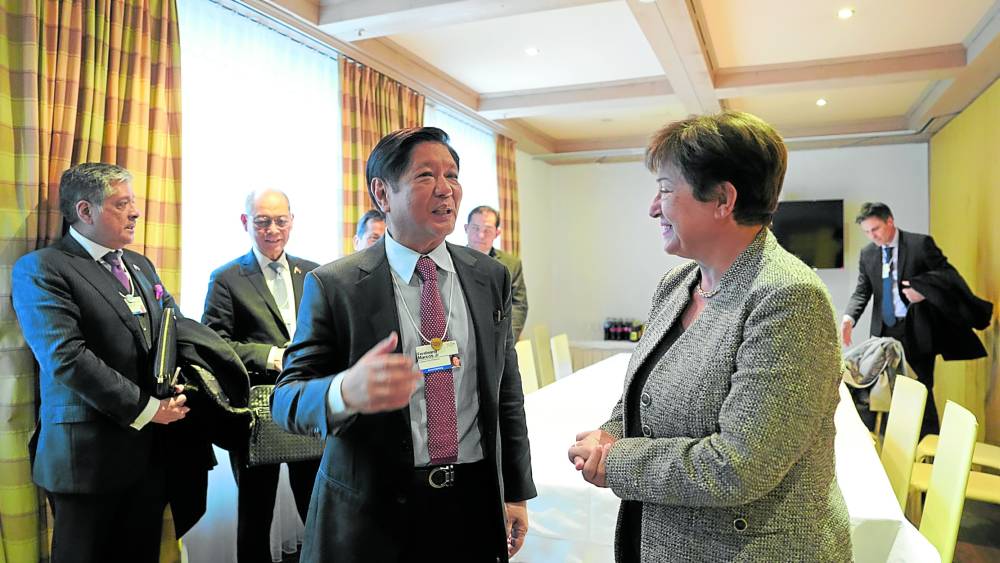
AMID GLOBAL TURBULENCE International Monetary Fund Managing Director Kristalina Georgieva (right), after a bilateral meeting with President Marcos, commended the Philippines as an “exceptionally well-performing country”. —CONTRIBUTED PHOTO
DAVOS, SWITZERLAND— President Marcos has set a higher fighting target of 7-percent economic growth for the Philippines despite all the global headwinds this year as his chief private sector adviser expressed optimism that, under the current administration, the country could be be the “next big thing” in Asia.
During the country strategy dialogue hosted by the World Economic Forum (WEF) on Tuesday, Marcos said “the picture is slightly different” for the Philippines amid a specter of a global recession this year.
“We project our economy to grow by around 7 percent in 2023. Our actual projection is 6.5 but there are signs that we might be able to surpass that,” he said during the second day of the annual conference in this alpine ski resort town.
The International Monetary Fund is expecting global economic growth to soften to 2.7 percent this year from 3.2 percent last year and 6 percent in 2021.
The President said the country’s strong macroeconomic fundamentals, fiscal discipline, structural reforms and liberalization of key sectors instituted over the years have enabled it to “withstand the negative shocks caused by the pandemic and succeeding economic downturns and map a route toward a strong recovery.”
This was as he pitched to the global audience investment opportunities in the country such as in renewable energy, agro-processing, transportation, infrastructure development and several public-private partnerships in the pipeline, among others.
Private sector optimism
Sabin Aboitiz—lead convenor of President Marcos’ Private Sector Advisory Council, and one of the seven business tycoons who joined the powerhouse Philippine delegation to the WEF—cited the president’s commitment to pursue even the difficult structural reforms that would benefit the country for the long term.
Aboitiz, who has been friends with Marcos for decades, said the president’s strong faith in working with the private sector could help the country raise the large amount of money needed to build crucial infrastructure like roads, seaports and airports and revitalize the agriculture sector.
As such, he said corporate Philippines could partner with the best in the world to solve the country’s problems—“not band-aid [solutions] but to structurally change so that it works for the generations to come and not just, you know, for three months or one year.”
“I think Philippines is really gonna be the next big thing in Asia. We are very excited to work with the government today because we see that they really appreciate the private sector,” he said.
“For example, you know, the government cannot do digitalization alone. It needs the private sector, you know, from the talent and the knowledge that we gain from all over the world which is changing so fast,” he said.
The President noted the government’s intensified measures to help improve local food production and help the farm and fisheries sector to strengthen and quickly recover from the deterioration of the agricultural value chain.

